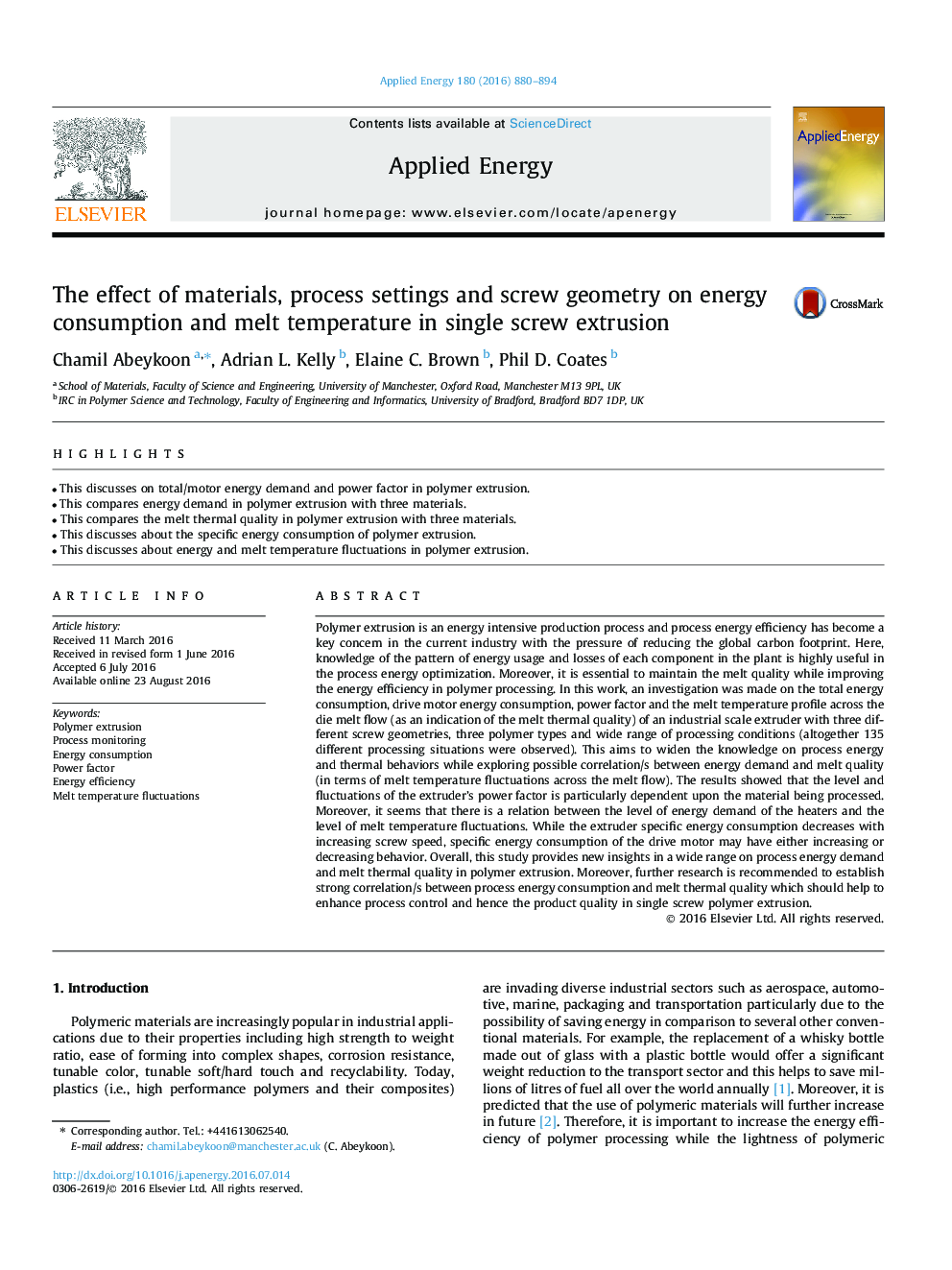| کد مقاله | کد نشریه | سال انتشار | مقاله انگلیسی | نسخه تمام متن |
|---|---|---|---|---|
| 6682382 | 501845 | 2016 | 15 صفحه PDF | دانلود رایگان |
عنوان انگلیسی مقاله ISI
The effect of materials, process settings and screw geometry on energy consumption and melt temperature in single screw extrusion
ترجمه فارسی عنوان
اثر مواد، تنظیمات فرآیند و هندسه پیچ در مصرف انرژی و دمای ذوب در اکستروژن تک پیچ
دانلود مقاله + سفارش ترجمه
دانلود مقاله ISI انگلیسی
رایگان برای ایرانیان
کلمات کلیدی
اکستروژن پلیمر، نظارت بر فرآیند، مصرف انرژی، عامل قدرت، بهره وری انرژی، نوسانات دما ذوب،
ترجمه چکیده
اکستروژن پلیمر یک فرآیند تولید انرژی فشرده است و بهره وری انرژی در صنعت فعلی با فشار کاهش پدیده کربن جهانی تبدیل به یک نگرانی کلیدی شده است. در اینجا، شناخت الگوی مصرف انرژی و تلفات هر مولفه در گیاه در بهینه سازی انرژی فرآیند بسیار مفید است. علاوه بر این، حفظ کیفیت ذوب در حین بهبود کارایی انرژی در پردازش پلیمر ضروری است. در این کار، تحقیق بر روی کل مصرف انرژی، مصرف انرژی انرژی موتور، ضریب توان و مشخصات دم دما در جریان جریان ذوب (به عنوان نشانگر کیفیت حرارتی ذوب) یک اکسترودر مقیاس صنعتی با سه پیچ مختلف هندسه، سه نوع پلیمر و طیف وسیعی از شرایط پردازش (در مجموع 135 وضعیت مختلف پردازش مشاهده شد). هدف از این کار، گسترش دانش در مورد رفتار انرژی حرارتی و رفتار حرارتی در حالی است که با بررسی رابطه بین تقاضای انرژی و کیفیت ذوب (از لحاظ نوسانات دمای ذوب در جریان جریان ذوب) ممکن است بین همخط ممکن باشد. نتایج نشان داد که سطح و نوسانات ضریب توان اکسترودر به طور خاص بستگی به مواد مورد پردازش دارد. علاوه بر این، به نظر می رسد که بین میزان تقاضای انرژی بخاری ها و سطح نوسانات دما ذوب رابطه ای وجود دارد. در حالی که مصرف انرژی خاص اکسترودر با افزایش سرعت پیچ کاهش می یابد، مصرف انرژی خاص موتور درایو ممکن است رفتار یا افزایش یا کاهش یابد. در مجموع، این مطالعه بینش جدیدی را در گستره وسیعی از تقاضای انرژی فرایند و کیفیت حرارتی ذوب در اکستروژن پلیمر فراهم می کند. علاوه بر این، تحقیق بیشتر برای ایجاد رابطه قوی بین مصرف انرژی فرایند و کیفیت حرارت حرارتی توصیه می شود که باید به منظور افزایش فرایند کنترل و از این رو کیفیت محصول در اکستروژن پلیمر تک پیچ.
موضوعات مرتبط
مهندسی و علوم پایه
مهندسی انرژی
مهندسی انرژی و فناوری های برق
چکیده انگلیسی
Polymer extrusion is an energy intensive production process and process energy efficiency has become a key concern in the current industry with the pressure of reducing the global carbon footprint. Here, knowledge of the pattern of energy usage and losses of each component in the plant is highly useful in the process energy optimization. Moreover, it is essential to maintain the melt quality while improving the energy efficiency in polymer processing. In this work, an investigation was made on the total energy consumption, drive motor energy consumption, power factor and the melt temperature profile across the die melt flow (as an indication of the melt thermal quality) of an industrial scale extruder with three different screw geometries, three polymer types and wide range of processing conditions (altogether 135 different processing situations were observed). This aims to widen the knowledge on process energy and thermal behaviors while exploring possible correlation/s between energy demand and melt quality (in terms of melt temperature fluctuations across the melt flow). The results showed that the level and fluctuations of the extruder's power factor is particularly dependent upon the material being processed. Moreover, it seems that there is a relation between the level of energy demand of the heaters and the level of melt temperature fluctuations. While the extruder specific energy consumption decreases with increasing screw speed, specific energy consumption of the drive motor may have either increasing or decreasing behavior. Overall, this study provides new insights in a wide range on process energy demand and melt thermal quality in polymer extrusion. Moreover, further research is recommended to establish strong correlation/s between process energy consumption and melt thermal quality which should help to enhance process control and hence the product quality in single screw polymer extrusion.
ناشر
Database: Elsevier - ScienceDirect (ساینس دایرکت)
Journal: Applied Energy - Volume 180, 15 October 2016, Pages 880-894
Journal: Applied Energy - Volume 180, 15 October 2016, Pages 880-894
نویسندگان
Chamil Abeykoon, Adrian L. Kelly, Elaine C. Brown, Phil D. Coates,
